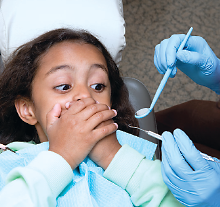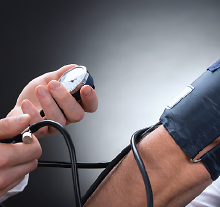Journal Digest
Researchers Develop Self-Help CBT Resource for Dental Anxiety

Some people experience significant anxiety over trips to the dentist. While cognitive-behavioral therapy (CBT) has been shown to be effective in managing dental anxiety, it can be difficult to access such therapy.
A team of researchers in the United Kingdom has developed a self-help CBT resource that appears to reduce dental anxiety in children. The researchers described their work in JDR Clinical and Translational Research.
After consulting with families and dental professionals to inform the development of the self-help CBT resource, 48 children (aged 9 to 16) who reported having dental anxiety evaluated the resource during a trip to the dentist. On average, children using the resource experienced a seven-point reduction in their anxiety scores on the Modified Child Dental Anxiety Scale.
“These findings provide preliminary evidence for the effectiveness and acceptability of the resource in reducing dental anxiety in children and support the further evaluation of this approach in a randomized, control trial,” the authors wrote.
Porritt J, Rodd H, Morgan A, et al. Development and Testing of a Cognitive-Behavioral Therapy Resource for Children’s Dental Anxiety. JDR Clin Trans Res. November 1, 2016. [Epub ahead of print]
Cognitive-Processing Therapy May Help Service Members With PTSD

Individual sessions of cognitive-processing therapy (CPT)—a trauma-focused therapy in which patients are taught to develop balanced thinking about traumatic events—may be better than group sessions at reducing the severity of posttraumatic stress disorder (PTSD) in active-duty military members, according to a study in JAMA Psychiatry.
A total of 268 active-duty personnel with PTSD were randomly assigned to 90-minute group sessions (consisting of eight to 10 participants per group) or 60-minute individual sessions twice weekly for six weeks.
While individual CPT was found to be more efficacious than group CPT at reducing PTSD severity, patients in both treatment conditions experienced significant decreases in PTSD symptoms over time. Depression and suicidal ideation improved equally with both forms of CPT. “However, even among those receiving individual CPT, approximately 50 percent still had PTSD and clinically significant symptoms,” the authors noted.
“To our knowledge, these findings are the strongest to date with regard to existing treatments for PTSD in active-duty military and veterans, but more work is required to improve outcomes,” they concluded.
Resick P, Wachen J, Dondanville K, et al. Effect of Group vs Individual Cognitive Processing Therapy in Active-Duty Military Seeking Treatment for Posttraumatic Stress Disorder. JAMA Psychiatry. November 23, 2016. [Epub ahead of print]
Omega-3s Fail to Reduce Risk of Psychosis

Although a small, single-center trial suggested that omega-3 polyunsaturated fatty acids (PUFAs) might improve outcomes in patients at ultrahigh risk (UHR) for psychosis, a larger, multicenter study now suggests omega-3s may be no better than placebo at preventing psychosis, reducing symptoms, or improving function in UHR patients.
An international team of researchers randomly assigned 304 people (aged 13 to 40) who met UHR criteria to take capsules containing 1.4 grams of omega-3 PUFA or placebo daily in combination with up to 20 sessions of cognitive-behavioral case management (CBCM) for six months.
When the authors compared the rates of transition to psychosis status at six and 12 months, they found no significant difference between the groups; transition rates were 5.1 percent and 11.2 percent in the control group compared with 6.7 percent and 11.5 percent in the PUFA group.
Adverse events were reported in both groups, with less than 1 percent of the participants reporting increased bleeding and approximately 30 percent reporting gastrointestinal issues.
“This trial has failed to replicate the findings of a previous single center study,” wrote the study authors. “[F]uture research will help to ultimately determine whether omega-3 PUFAs have a role in the reduction of risk and early treatment of psychotic disorder.”
McGorry P, Nelson B, Markulev C, et al. Effect of ω-3 Polyunsaturated Fatty Acids in Young People at Ultrahigh Risk for Psychotic Disorders. JAMA Psychiatry. November 23, 2016. [Epub ahead of print]
Standing Blood Pressure Found to Predict Patients Most Likely to Respond to Prazosin

The α1-adrenoreceptor antagonist prazosin can reduce symptoms of posttraumatic stress disorder (PTSD), but determining which patients are most likely to benefit from the medication can be challenging.
A study appearing in Biological Psychiatry suggests that patients who have higher blood pressure before beginning prazosin treatment may experience greater improvements on the medication. These results suggest that blood pressure readings could be used to identify people with PTSD who might benefit the most from this medication.
Researchers at the Veterans Administration Puget Sound Health Care System and the University of Washington examined the baseline standing systolic and other BP parameters on PTSD outcome measures from the previously reported randomized, controlled trial of combat veterans with PTSD who had been given either prazosin or placebo over 15 weeks.
In the 32 participants who had received prazosin, each 10-mm Hg increase of standing systolic blood pressure above 110 mm Hg resulted in a 14-point reduction of the Clinician-Administered PTSD Scale score at the end of the study. There was no correlation between baseline blood pressure and PTSD outcomes among placebo users.
“These results also are consistent with α1AR activation contributing to PTSD pathophysiology in a subgroup of patients,” the authors noted.
Raskind M, Millard S, Petrie E, et al. Higher Pretreatment Blood Pressure Is Associated With Greater Posttraumatic Stress Disorder Symptom Reduction in Soldiers Treated With Prazosin. Biol Psychiatry. November 15, 2016; 80(10):736-742.
Pessimism May Increase Risk of Death From Coronary Heart Disease

Having a negative outlook on life may increase risk of death from coronary heart disease (CHD), a study published in BMC Public Health reports. The findings suggest that pessimism, like depression, may point to those at heightened risk of death from CHD.
To investigate possible associations between optimism, pessimism, and CHD mortality, the researchers at Päijät-Häme Central Hospital in Finland tracked the health outcomes of 2,815 adults aged 52 to 76 who participated in an aging study in 2002, during which cardiovascular health and levels of optimism and pessimism were assessed.
The authors found that participants who died of CHD within the 11-year follow-up period were significantly more pessimistic at baseline than those who were still alive. The finding applied to both men and women.
Among the subjects in the highest quartile of pessimism, the adjusted risk of death caused by CHD was more than two times greater than subjects in the lowest quartile. Optimism did not seem to have any connection with the risk of CHD-induced mortality.
Because pessimism “can be measured easily and noninvasively, … it might be a very useful tool together with the other known risk factors to determine the risk of CHD-induced mortality,” the authors concluded. ■
Pänkäläinen M, Kerola T, Kampman O, et al. Pessimism and Risk of Death From Coronary Heart Disease Among Middle-Aged and Older Finns: An Eleven-Year Follow-Up Study. BMC Public Health. November 17, 2016; (1):1124.



